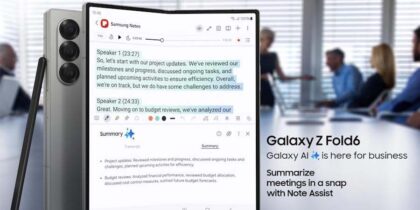In this News Insight, CIO highlights the six top IT skills that will be in demand over the coming decade. For a big picture view on the future of IT, and how to provide the right environment and technology for your workforce to thrive in the Next Mobile Economy, download our report on workforce enablement. —Samsung Insights editorial team
With technology proliferating throughout the enterprise, it’s not surprising that the number of IT jobs in the United States is projected to grow significantly in the coming decade. The federal Bureau of Labor Statistics predicts employment in computer and information technology occupations to grow 13 percent by 2026, well above the overall job growth rate of 7.4 percent.
IT leaders, recruiters and industry researchers say most of the skills that IT workers have today will still be needed in the future, but some specific skills will be in higher demand than others, and IT roles and positions will have to adjust to an emerging technology and business landscape.
“Growth is projected for nearly every IT occupation we see now through 2024, but the roles are changing and evolving,” says Tim Herbert, senior vice president of research and market intelligence at IT trade association CompTIA.
Here’s a look at what experts expect to be the hottest skills three to five years down the road — and which skills will face waning demand in the years ahead.
Developers will still be kings
Despite the rise of drag-and-drop low-code tools, development skills will continue to be among the hottest skills in the coming decade, with the BLS predicting a 24 percent growth in software developer jobs from 2016 to 2026. Silicon Valley will drive a lot of that demand, Herbert says, but companies across all industries are looking for application development talent as they push forward with digital transformations.
Enterprise IT departments will have a growing need for specific languages. Herbert and others expect both scripting and object-oriented coding languages to top the list in the years ahead, with C++, Django, JavaScript, Python, R, Ruby and Ruby on Rails among the most in-demand skills in the future.
They also expect the ability to build and integrate using application program interfaces (APIs) will be a high-demand skill.
Additionally, CIOs will increasingly need developers who can work with agile and DevOps methodologies, so the most employable developers now and in the future will be those who have more to offer than just knowing how to code, says Jason Hayman, market research manager for IT staffing and services firm TEKsystems.
“You have to be able to understand what pain point one team is having so you can break down those siloes and solve those problems,” Hayman says, noting that developers will have to have testing skills and knowledge of the different DevOps tools like Chef, Docker, Git and Puppet.
That’s not all.
“There’s an expectation that developers will be more of a full-stack developer in the future,” Herbert says, and they’ll have to understand programming for cloud, machine learning and data with something such as Mongo DB for Hadoop databases.
New technologies will drive new roles and skill combinations
In its 2018 IT Industry Outlook report, CompTIA lists 14 emerging jobs, many of which are needed to leverage technologies that are in their early stages of enterprise deployment. Those positions include machine learning trainer/scientist, AI developer, industrial IoT engineer, blockchain developer/engineer and robotics engineer.
Similarly TEKsystems’ 2018 IT Forecast report says IoT, AI, machine learning, automation, and digital marketing/customer initiatives “are on the radar as critical investments to continue to transform the business.”
Hayman says these technologies require a range of skills, from the ability to write algorithms to experience working with Hadoop and data-oriented systems.
These emerging technologies will create new positions that require a convergence of IT skills, agrees Ray Trygstad, professor of IT and director of undergraduate advising in the Illinois Institute of Technology’s Department of Information Technology and Management.
For example, he sees companies creating IT positions around recommender systems — that is, applications that use data to produce recommendations and options for users. These new IT positions will require professionals who understand development, data and analytics, machine learning and AI.
Similarly, Trygstad says the growing list of IoT-related jobs in enterprise IT will require workers who understand IoT software, IoT hardware, integration technologies and security. He sees IoT as an area poised for significant growth.
He adds: “In three to five years we’ll have people working in IoT, but we don’t know what they’ll be called yet.”
An ever increasing need for cybersecurity skills
Cybersecurity professionals are already among the most in-demand IT specialists, and that demand is expected to grow significantly as the volume and complexity of systems increases — and as bad actors become increasingly skilled, says Tom Bakker, director of the specialist technology group at Chicago-based staffing firm LaSalle Network.
Demand already outpaces supply, Bakker says, and that gap that will only expand in the upcoming years. The Global Information Security Workforce Study (GISWS), conducted every two years by the Center for Cyber Safety and Education and the International Information System Security Certification Consortium, predicted in its most recent report a shortage of 1.8 million cybersecurity professionals by 2022.
That will leave organizations scrambling to find qualified cybersecurity talent, Bakker says, noting that college degrees in cybersecurity and cybersecurity certifications will remain in high demand. Key cybersecurity skills center on identity and access management, penetration testing, risk analysis and security assessment.
Bakker also anticipates more IT organizations inserting security into their DevOps shops to move to the more inclusive DevSecOps framework, thereby putting pressure on cybersecurity professionals to understand more pieces of development and operations (and similarly requiring other IT professionals to acquire security skills).
“People who can check all three boxes will be in highest demand,” Bakker adds.
Demand for data-related skills
The 2017 report The Quant Crunch predicts significant growth in data-related roles, estimating that the number of data-related jobs in the United States will increase to 2.7 million by 2020, up from 2.3 million in 2015.
Like other high-demand IT jobs, these data positions require a mix of skills. “Demand for a new breed of professionals skilled in data, analytics, machine learning, and artificial intelligence requires a requisite response from both higher education and workforce development,” according to the report, from Burning Glass Technologies in partnership with IBM and Business-Higher Education Forum.
Look for not only a growing number of data scientist positions but jobs for big data engineers, database managers, database developers and data architects, experts say.
“The hype now is AI and increased automation and that means now and down the road a need for data scientists, data analysts and people who are really able to keep the engine moving and process all this data coming through,” adds Stephen Zafarino, senior director of recruiting at Mondo, a national staffing firm specializing in IT, tech and digital marketing.
Although different divisions within any given organization will be hiring for data skills in the future, IT departments will need professionals with knowledge of SQL and data visualization tools as well as professionals who know now to gather, clean, analyze or present data.
“You have this sea of data that organizations collect, and they’re being trained on how to pull that important information out and how to present it to drive business forward, make decisions about opportunity. So data science, data visualization, those skills are just growing in demand,” says Ron Delfine, director of the Career Services Center at Carnegie Mellon University’s Heinz College.
Demand to drop for architecture, networking, support skills
Entrust Datacard CIO Anudeep Parhar say he believes that as organizations put more into the cloud they’re heading toward hyperconverged infrastructure, in which IT essentially delivers infrastructure as code or as an app.
As such, he says IT professionals will have to work more as solutions providers to the organizations they serve.
Moreover, he says hyperconverged infrastructure will make some traditional IT skills, such as configuration and administration skills, obsolete or at least in less demand. Already he says he sees IT workers in those positions shifting into engineer-type jobs or DevOps teams where they can focus more on a solutions provider role rather than the physical infrastructure.
Others see a similar trend, with cloud computing also slowing demand for networking engineers and systems administrators along with hardware maintenance skills and network configuration skills.
Emerging technologies will impact support and help desk jobs as well, several experts say, as IT departments increasingly implement automation and AI to address many of the user requests that once needed humans to handle.
“There is an expectation that some of these jobs will be displaced,” Herbert says. “So if someone has only support skills for desktop devices or peripherals, they could be a risk if that’s all they can bring to an organization.”
Hybrid roles will take center stage
With so many companies embarking on digital transformations, business-IT hybrid roles will emerge to help organizations fulfill their evolving digital visions.
For example, executives in Notre Dame’s Office of Information Technologies may not know whether headcount will grow in the future, but they do know they’ll need new skills for the university’s strategic initiatives, skills that will increasingly emphasize business smarts and the ability to deliver productive user experiences.
For starters, they plan to hire more solutions architects to join the two solutions architect positions they created over the past three years. The position, structured to support the institution’s digital transformation work, requires someone who has a range of technical skills and business acumen, understands the university’s breadth of technology, has an eye toward emerging technologies, and can translate all that to business needs, says Katie Rose, who as senior director of user services answers directly to the CIO.
“We’re going to need more people who have that big-picture view but who can get down to a very specific solution to develop the right tools for a very particular use case,” she adds.
Looking ahead, she says the IT department will continue to seek professionals versed with cloud computing — a critical skill set for the organization as it already has 85 percent of its services in the cloud and expects to grow that figure. And IT will need people with user design skills, as it increases its focus on delivering better user experiences and more efficient technology services.
This mix of user experience skills, business acumen and cloud know-how is typical of organizations undergoing digital transformations, where technical skills are enhanced with soft and traditionally non-technical skills to create hybrid roles. And with so many organizations redefining their strategic visions today, what the next decade holds for these IT roles is still being written.
“We look at what Notre Dame is trying to accomplish in the next 10 years, and then we base our IT strategic needs, including staffing, off that plan,” Rose says.
This article was written by Mary K. Pratt from CIO and was legally licensed through the NewsCred publisher network. Please direct all licensing questions to legal@newscred.com.
Learn how to close the tech gap and enable your workforce for the Next Mobile Economy in this white paper.
![]()








